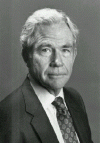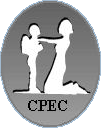BIOGRAPHY
JOHN E. COONS
Professor
Emeritus of Law University of California at Berkeley

John E. Coons
was born in Duluth, Minnesota. In 1950
he graduated from the University of Minnesota which
honored him with a doctorate in 1999. Coons earned his J.D. degree from
Northwestern in 1953. He served first as an enlisted man, then in the Judge
Advocate General Corps of the Army from 1953
-1955; stationed in the Pentagon, he represented the Army in
numerous trials involving disputes between government contractors and various
procurement agencies. In 1955 he joined the law faculty at Northwestern
where he remained until moving to
the University of California, Berkeley, in 1967.
Married to Marylyn Bowles in 1956, the Coonses have five children
and three grandchildren.
Coons' teaching was concentrated in basic areas
such as Contracts and Property but always with a seminar in
areas of thought on the periphery of law. These included sociology,
anthropology, psychiatry, philosophy,and theology. Since 1968
he has taught the rights of families, the organization and finance of education,
and the moral and economic theory underlying school choice.
A 1962
article by Coons on the application of
the anti-trust laws to civil rights boycotts
brought him in contact with leaders of the burgeoning
civil rights move-
ment. In March of 1965 he participated
in the Selma encounters which led to the Montgomery March
and later was to counsel
Dr. M. L. King and his S.C.L.C. colleagues during "Operation
Breadbasket." During these same years Coons moder-
ated a weekly
half-hour radio show which on several occasions
hosted Milton Friedman, then at Chicago. Forty
years later, the two still disagree on
the ideal structure of school choice.
Coons' interest
in schools began in 1962 when he was engaged by the U.S. Commis-
sion
on Civil Rights to assess the compliance
of Chicago schools with the racial neutrality principle. This inquiry
led him to confront the occult structure of public school
finance. In 1970, with his former
students William Clune and Stephen Sugarman,
he published Private Wealth and Public Education which
provided the theory for the California Supreme Court in Serranno v Priest
in 1971 and 1976. Coons argued these cases, emphasizing that one of
the solutions to the oppressive system lay in subsidized school choice.
Coons' early conclusion was that neither an
increase nor redistribution of dollars would fix education unless
and until ordinary families and the poor were
able to choose their own schools. Between the 1960s and 2001 Coons and Sugarman
were to collaborate on five bookssupporting school choice
plus dozens of articles, op-eds, and legislative models. In
1978 they tried to put the first school choice initiative on the state
ballot and have consistently worked for and supported coherent efforts by others.
The language of their models has found its way into the legal structure of the
programs operating successfully in Milwaukee, Cleveland, and the Sate of Florida.
In the 70s and early 80s, Coons served on President
Carter's National Commission on School Finance; in the 90s he
was a member of the Committee of Advisors to the Russian
Ministry of Education.
In recent years Coons haspublished
works on moral theory including By Nature Equal: TheAnatomy
ofa Western Insight (Princeton). A central theme of
this work (with Patrick Brennan) is that the well-intentioned imposition
of uniform outcomes is futile and destructive. Human equality is not
a coherent or benign social aspiration; it is, however, the fundamental
moral fact about humans and the foundation of just institutions.
Education Revolt in
Watts--A Reason.tv
Drew Carey Video




